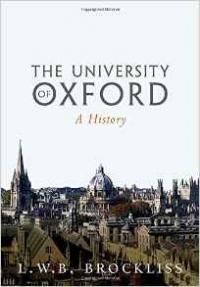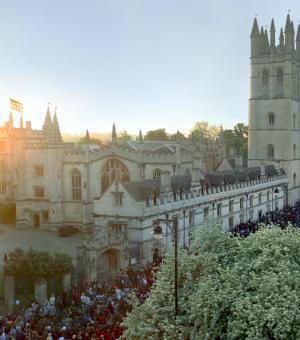Professor Laurence Brockliss
Lawrence Brockliss has served on many teaching, advisory and management committees for the Faculty of History over the course of the last 15 years.
Professor Brockliss works on the history of education, science and medicine in early modern France and Britain and has a general interest in the history of European ideas. He is particularly interested in the institutionalisation of ideas. His books include French Higher Education in the Seventeenth and Eighteenth Centuries (1987), The Medical World of Early Modern France (1997, with Colin Jones), Calvet's Web (2002) and the prize-winning Nelson's Surgeon (2005, with John Cardwell and Michael Moss).
Professor Brockliss is also interested in the history of childhood and is director of the Oxford Centre for the History of Childhood, the only such centre in the UK.
See page on Magdalen College website
The University of Oxford: A History

This fresh and readable account gives a complete history of the University of Oxford, from its beginnings in the eleventh century to the present day. Written by one of the leading authorities on the history of universities internationally, it traces Oxford's improbable rise from provincial backwater to one of the world's leading centres of research and teaching.
Laurence Brockliss sees Oxford's history as one of discontinuity as much as continuity, describing it in four distinct parts. First he explores Oxford as 'The Catholic University' in the centuries before the Reformation, when it was principally a clerical studium serving the needs of the Western church. Then as 'The Anglican University', in the years from 1534 to 1845 when Oxford was confessionally closed to other religions, it trained the next generation of ministers of the Church of England, and acted as a finishing school for the sons of the gentry and the well-to-do. After 1845 'The Imperial University' saw the emergence over the following century of a new Oxford - a university which was still elitist but now non-confessional; became open to women as well as men; took students from all round the Empire; and was held together at least until 1914 by a novel concept of Christian service. The final part, 'The World University', takes the story forward from 1945 to the present day, and describes Oxford's development as a modern meritocratic and secular university with an ever-growing commitment to high-quality academic research. Throughout the book, Oxford's history is placed in the wider context of the history of higher education in the UK, Europe, and the world. This helps to show how singular Oxford's evolution has been: a story not of entitlement but of hard work, difficult decisions, and a creative use of limited resources and advantages to keep its destiny in its own hands.
- Early modern France and Britain 1500-1850
Professor Brockliss has just finished writing a one-volume history of the University of Oxford. He is also preparing for publication the MS autobiography of a Montpellier doctor, naturalist and tourist, Pierre-Joseph Amoreux (1741-1824). This is the fullest autobiography left by a French republican of letters in the Age of Enlightenment.
Professor Brockliss is also involved in two collaborative research projects. The first with Michael Moss and John Cardwell is a study of the fight against malaria in the long nineteenth century and is essentially a history of the political economy of a disease. The second, again with Micheal Moss, is described more fully below . It is a study of the devlopment of the professions as a distinctive class in nineteenth-century Britain based on the study of a thousand families through four generations.
Laurence Brockliss is involved in the following research projects:
-
The Professions in Nineteenth-Century Britain and Ireland
The nineteenth century witnessed a huge expansion in the number of people in Britain and Europe described as members of a profession. Industrialisation, imperial expansion and the growth of the state led to an ever-increasing demand for lawyers, doctors, religious ministers and teachers, as well as newer service providers such as accountants, bankers and civil engineers. Many historians have viewed the professions as forming part of a wider middle class that also included manufacturers, merchants and entrepreneurs. However we simply do not know whether the professions acted differently from other members of the middle class in terms of who they married, how they were educated, the arrangements they made for their children and the social and cultural activities they engaged in. In short, we do not know whether they formed part of the wider middle class or were, as Harold Perkin once suggested, a distinct social class (1969).
Current DPhil Students
-
Rachel Scally
I currently teach:
|
Prelims |
FHS |
|
British History 4 and 5 |
British History 4 and 5 |
|
General History 3 |
General History 7 - 10 |
|
Tocqueville |
Scientific Rev SS |
|
|
Voltaire to Balzac FS |




